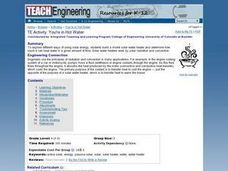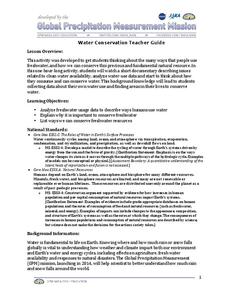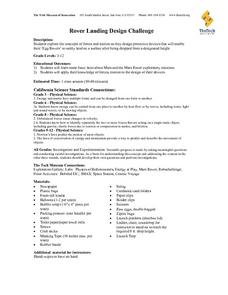Curated OER
Transfer of Thermal Energy
Students define temperature and heat, distinguish between temperature and heat flow, calculate amount of heat energy released or absorbed in chemical process, and design procedure, through experimentation, to gather and evaluate data to...
Foundation for Water & Energy Education
How Can Work Be Done with Water Power? Activity C
Third in a set of lessons regarding reservoirs, dams, and hydropower, this involves a two-day hydropower plant simulation. Collaborative groups build, maintain, and finance the plant. The transparency of the reservoir setup can be...
New York State University
Law of Conservation of Energy
Become energy efficient with a presentation that covers the Law of Conservation of Energy with friction. It also includes energy transformations, power, and units of measurement.
University of Minnesota
Homeostasis of Thermoregulation
Whether you're battling the flu or trying to warm up on a chilly day, your body's ability to react to temperature change is fascinating! Anatomy scholars discover the fantastic feedback loops that control body temperature in a rigorous...
Curated OER
TE Activity: You're in Hot Water
Students study different ways of using solar energy. They design a solar water heater and determine how much water it can heat in a set amount of time. They examine how the heaters work by solar radiation and convection.
Curated OER
Where Did They Come From?
Give science learners nine questions about the biogeography of hydrothermal vents and turn them loose to research this fascinating habitat. Working in cooperative groups, they prepare a report that addresses each of the questions. A...
Curated OER
The Hydrologic (Water) Cycle
Learners construct a model of the hydrologic cycle, and observe that water is an element of a cycle in the natural environment. They explain how the hydrologic cycle works and why it is important, and compare the hydrologic cycle to...
Texas State Energy Conservation Office
Investigation: Insulation
Youngsters compare the heat-holding abilities of three different cans by insulating two with different materials and measuring the temperature change of hot water over a 20-minute period.
Science Geek
Basic Thermochemistry
Heat is more than just temperature, as viewers discover throughout a presentation about thermochemistry that emphasizes vocabulary. Definitions include joule, calorie, energy, enthalpy, calorimetry, exothermic and endothermic process,...
University of California
Hot! Hot! Hot!
Calories are not tiny creatures that sew your clothes tighter every night, but what are they? A science lesson plan, presented at multiple levels, has learners experiment with heat, heat transfer, and graph the function over time. It...
Teach Engineering
Energy Conversions
What energy conversions occur in the operation of a device? Small groups investigate devices and the energy conversions that occur. The groups create energy flow diagrams with added conversion processes for each of the devices...
Purdue University
Design of a Door Alarm
How does electricity work? Budding scientists explore the concepts of electrical currents and open and closed circuits with class discussion and a hands-on activity using a battery to turn on a light bulb. Learners also make predictions...
DiscoverE
Squishy Circuits
Make electricity flow through Play-Doh. Individuals create animals or other creatures using Play-Doh. The engineering aspect? Eyes that light up and Play-Doh that conducts electricity.
Curated OER
Gelatin Volcanoes
Students investigate magma flow using gelatin volcano models. In this earth science instructional activity, students sketch the magma bodies as observed from the top of their model. They explain why magma moves that way.
Colorado State University
Why Does the Wind Blow?
Without wind, the weather man wouldn't have much to talk about! Blow away your junior meteorologists with a creative demonstration of how wind works. The activity uses an empty soda bottle and compressible Styrofoam peanuts to illustrate...
Carnegie Mellon University
Consumer Preferences in Lighting
What is a watt? This tongue-twisting, mind-bending question and others are answered through this instructional activity on the different lighting options available. With the support of a PowerPoint, teach your physical science class...
Curated OER
Water Conservation
Open learners' eyes to the challenge of finding safe drinking water – something we often take for granted in our country. The PowerPoint presentation includes images, graphs, diagrams, and even a video to stimulate discussion on how we...
Curated OER
Electrical Energy
Students conduct an experiment to find out how well different wires radiate heat when voltage is applied across the wire. They use the results of their experiments to consider how the gauge of the wire and the type of wire affect the...
Curated OER
Fire Brigade
Students examine how a community works together to protect them from fire. They work together to design a functional tool that could be helpful in fighting fires. They share their tool with the class.
Curated OER
Rover Landing Design Challenge
Students examine the concepts of forces and motion. They work together to design protective devices for their egg rovers as they are dropped from a specific height. They record their observations and discuss.
Exploratorium
Short Circuit
Though not commonly searched for, this is a vivid demonstration of how a fuse can be blown, or rather, how resistance works in an electric circuit. You will basically set up a circuit with no lights or bells or motors, allowing the wire...
Curated OER
Conductors and Insulators
Fifth graders explore conductors and insulators. For this science lesson, 5th graders act as electrons moving through a wire. Students break into groups representing conductors and insulators and explore how they work with electrons.
Curated OER
Step by Step
Students explore agriculture by creating a food production diagram. In this farming lesson, students read assigned text about the entities that assist in food production companies such as farmers, truckers and supermarkets. Students...
Curated OER
Castaway or Survivor
What a clever idea! Chemistry learners imagine themselves deserted on an island with a radio, but no batteries. They also have a few odds and ends in their pockets and storage chest. They are challenged to create a battery that will...

























